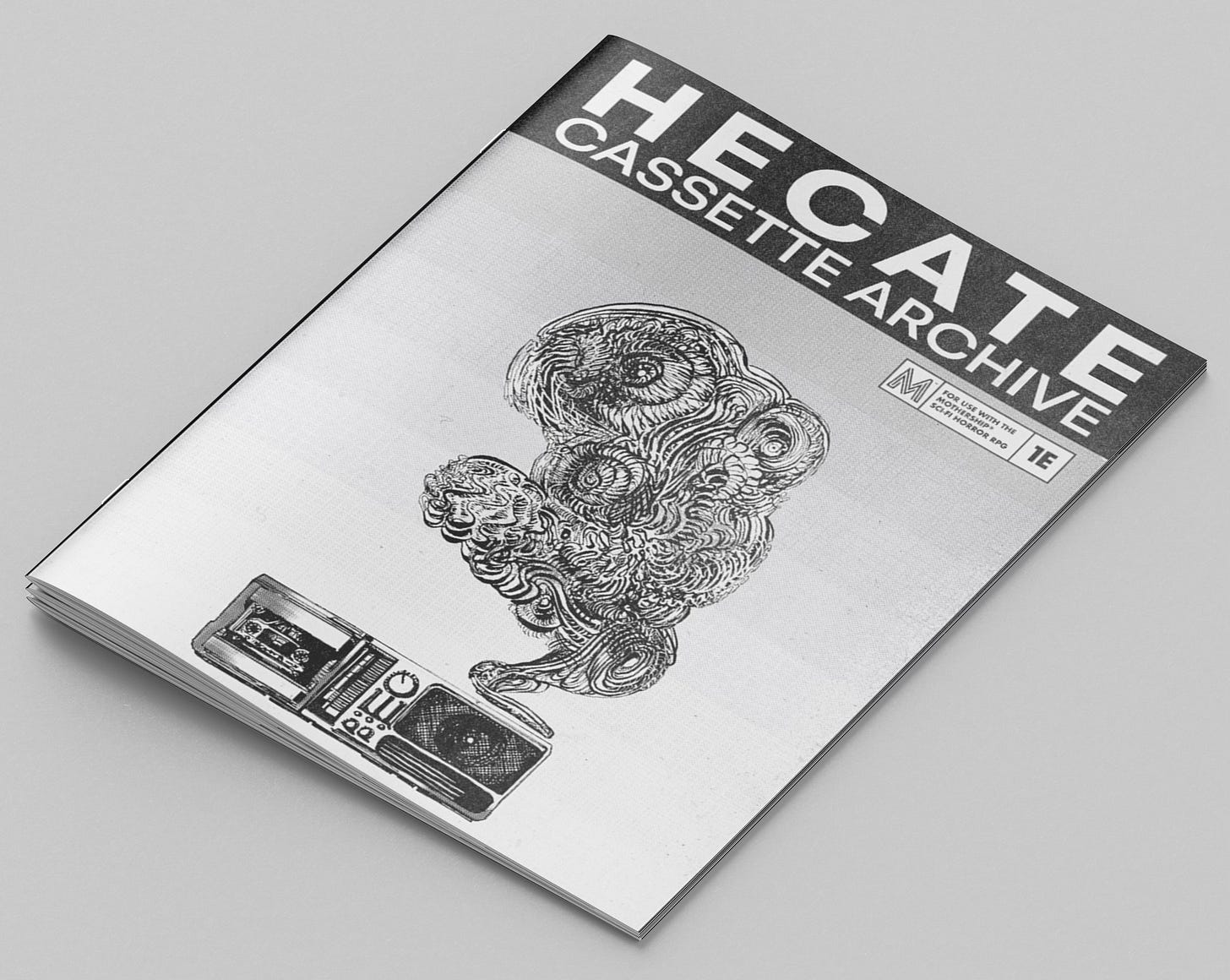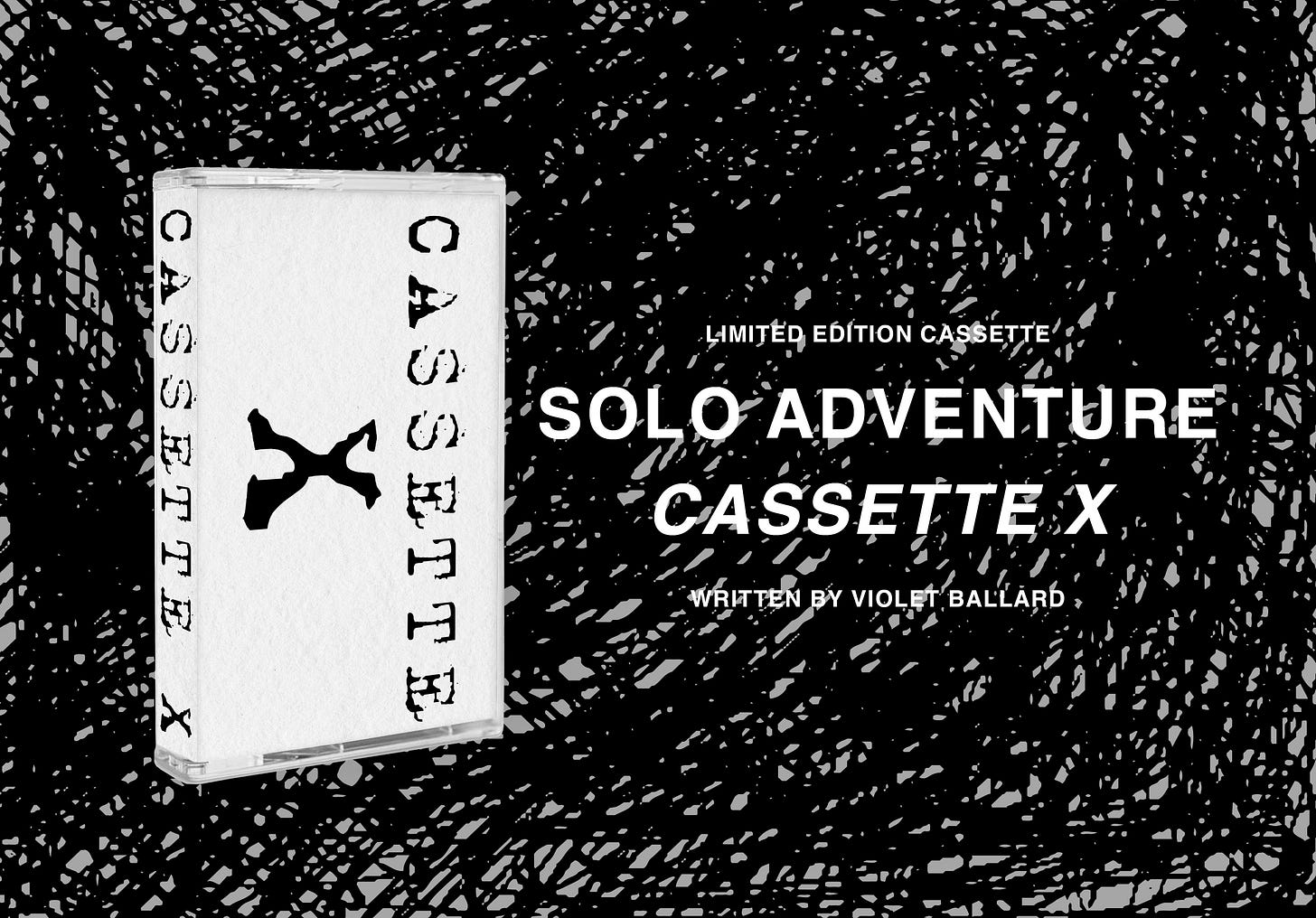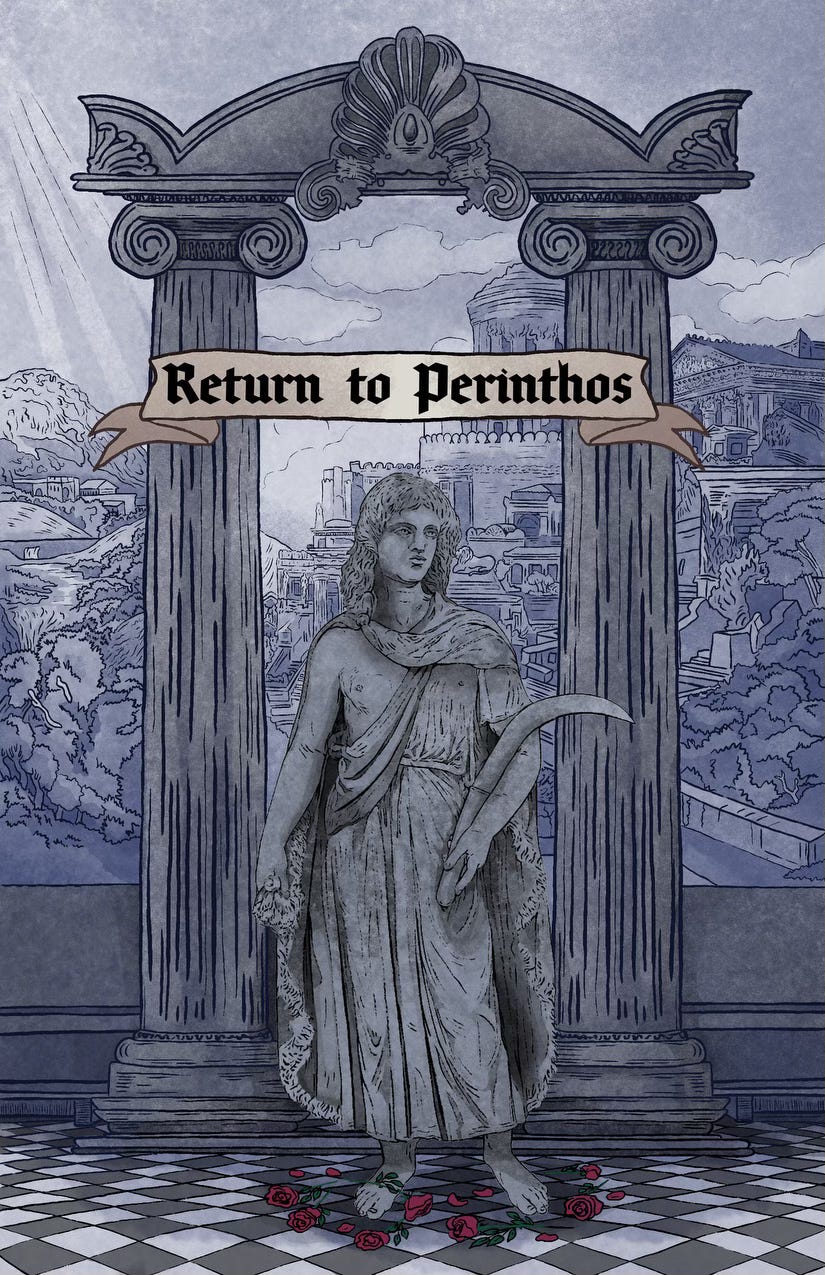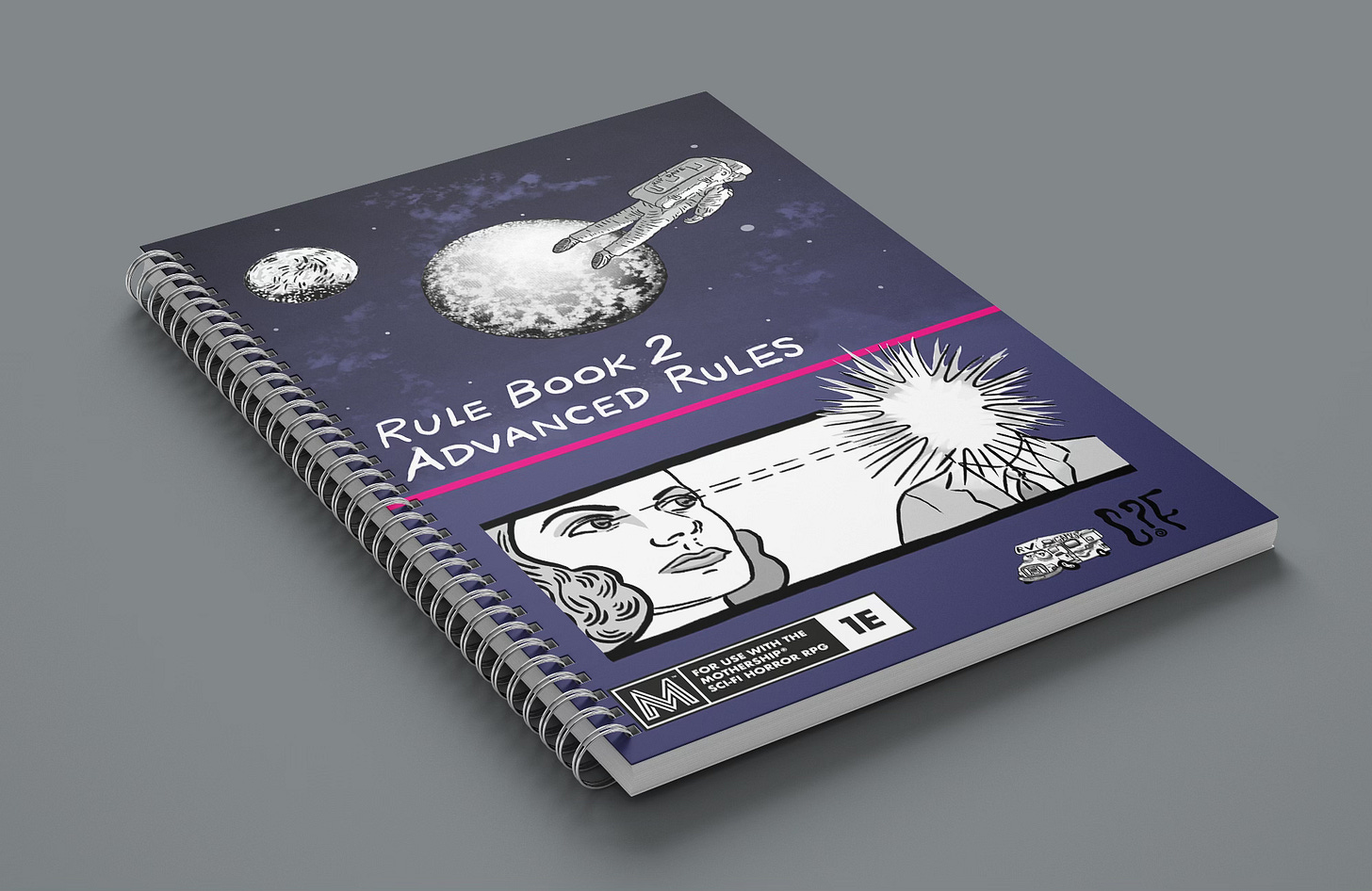The Adventure Gaming Periodical - Issue #10 - In Praise of Editors
We all need an editor and just maybe we'll find a partner
Welcome to Issue #10 of the AGP! This issue is an essay about working with editors with a focus on the editorial process of various in-progress and complete projects from RV Games.
Editorial Process
When I wrote my first Mothership modules, I did everything myself: writing, editing, art, layout, and all of the publishing work. I consider myself a strong writer, and a large part of my day job is coaching students with writing, so I looked at an external editor as a luxury. However, over the last two years, I have learned that an editor is actually a necessity because I need a coach just like my students. Feedback is important and getting it in productive ways is doubly critical.
Below, you’ll find a simplified graphic of the editorial process. It’s important to note how the bubbles overlap because the process isn’t nearly as linear as it makes it out to be. Every stage of editing can point to more drafting and revision, so there would be crazy arrows everywhere if you tried to show how cyclical the process is when it confronts the reality of writing and product development.
First Draft
This what I call the “bulk draft.” You’re going from your mess of notes and getting something on paper that you can work with. I use a movie analogy for this, you shoot hours and hours and hours of footage that get worked into an actual movie through editing. This is also the stage where you have your informal collaboration where you have your friends and collaborators who you bounce ideas off of and just let things grow and stew organically.
Second Draft
This draft is where you make your first draft make sense to you. You clean things up, you re-arrange, and you integrate new thoughts. You’re trying to get to the point where you can share a draft with an editor. This is where you can have friends and collaborators look at drafts as well, but you’re not receiving formal notes.
Developmental Edit
This is where you finally share a draft with an editor, and they give you notes on the work about structure, overall tone, and just how the piece works all together. You nail down themes and find the real core of the work with this way. This can be a one-time thing, but the best way to work with a dev editor is to get notes, make new revisions, and then cycle back to the dev editor for rounds of editing until the work is super solid. This isn’t always possible, though, depending on your budget and your relationship with your editor. During this phase, your editor can really push you to expand things or to “kill your darlings.”
Playtesting
If you are going to conduct play testing, I would do it during this phase of writing where you have something solid, but you’re trying to figure out if it works. An exception to this is if I’m working on a boardgame, wargame, or full ttrpg system, I get a prototype made and on the table super early during the drafting phases.
However, with ttrpg module development, I find play testing to be overrated since so much is adapted and changed from table to table, you really should just be building cool stuff for people to play with. It is also doesn’t help that personally, I am really good with play testing my own work when it’s about systems, but once it’s more fiction forward like a module, I get really self-conscious, so I hate running my own work.
It is difficult to find someone else to playtest a module, but this is more useful anyway since your market for a ttrpg module are really the folks running the game, not the players. If you know another creator, trading playtests with each other can be a cost effective way to have other folks run playlists for you.
Copyedit
Copy and line editing is when someone goes through your work line-by-line. This is to give it clarity and to hone your voice. There will generally be correction of grammar, spelling, and punctuation during this phase, but that is not the main focus of going through line-by-line. During this phase, you will find things that are unclear, and you will probably have to draft more revisions even though you thought that development was complete when you moved out of dev editing. I’m good at it, but I personally hate doing copyediting for myself or other folks, and I outsource it as much as possible.
Layout
After copyediting is when you move to layout, but I actually conceive of layout as another round of copyediting. As things get put into actual pages and spreads, wording needs to change, so that things fit and make sense in a graphical context. I specifically work with the graphic designer David Wilkie because he is also a very strong editor whose opinions I value highly, so I know that it will move through another round of editing when we move to layout.
Proofread
Proofing is the most straightforward form of editing, this is where an editor is looking through solely for errors in grammar, spelling, and punctuation. This isn’t important in the big scheme of things, but these kinds of errors are what make your work look less professional, which impacts sales and reach of your product. This is also the opportunity to check for page references, PDF bookmarks, table of contents, and index to make sure everything is accurate and accounted for.
Accessibility
Proofing is also the stage for final accessibility checking. However, all of the stages above need to have accessibility built-in. Making sure language is clear and that layout is usable is all part of accessibility. As a publisher, I do not like to work with folks who use Affinity over InDesign because of accessibility. If you design in InDesign using styles with tags attached, write alt text as it is placed, set reading order, and enter the correct metadata, you can export a PDF that is accessible and ready to go. PDFs that come from Affinity need to go through the extraordinarily clunky accessibility tools inside of Adobe Acrobat, which is something I hate doing more than I dislike copy and line editing.
Where does art fit in?
If you have the money, art and illustrations can also be a part of the drafting and editing process. You can commission (or create art) before you write your first draft to help you put your ideas together, you can source art during dev editing if you are stuck, and then you of course add more art for the layout phase, which can impact your writing and what you need to include or explain as discussed in the earlier section about layout.
Editorial Process in Action
In this next section, I will briefly discuss what the editorial process looks like and has looked liked for RV Games current projects. It’s useful to see examples of something in process, especially if you are considering working with an editor or editors on a project of your own.
Hecate Cassette Archive (HCA)
This is a project where I am taking on the role of a dev editor; however, it is a in a much different capacity than if I were a freelance editor. This project actually belongs to Joshua Justice, he is the lead writer and designer. We have a publishing partnership together where we evenly share net profits on the project. Joshua owns all of the rights to the project, and RV Games has a contract giving them the ability to publish the work and to receive their half of the profit. I personally act as the producer on this project, so my job is to shepherd Joshua’s work through the publishing process: development, production, fulfillment, and distribution. RV Games is owned my by wife and myself, but I am the only who does this work on behalf of the business entity. Either Joshua or RV Games can exit this contract at any time, and the rights for the work would revert to Joshua, and we would develop a plan for what to do with any physical inventory of the module.
This business partnership is very different than if we were a publisher commissioning a piece of work of if Joshua had come to me to publish or distribute a completed work. I am not on the clock as an editor, my hourly rate for this work is probably super low unless the work becomes a hit. It is in the best interest of Joshua and myself to develop the module as much as possible and to keep it moving forward since we don’t benefit financially unless the work sells.
The first drafts on this were done working David Wilkie who edited and laid out Joshua’s prior pamphlet adventure Radio Free Hekate. David was absolutely essential in working through notes and ideas, so Joshua could even get to a first and second draft.
Now that his drafts are ready for formal editing. I give Joshua notes and deadlines for new drafts, and we meet every other week. This goes both ways, thought, because when Joshua gives me a draft, I then owe him feedback. It is a mutually beneficial cycle. It’s not as Roz Leahy put it to me “going all J. Jonah Jameson.” It’s about mutual accountability. This is an equal partnership no unlike a marriage, we drive each other forward.
I have been able to support and push Joshua towards expanding the scale of the module without moving into scope creep territory because I am also the publisher responsible for product development. Joshua has also been able to help me and RV Games develop the prototype for what it means for something to be an RV Games module. We have published work before, but this is this first module that really stakes a claim on our identity, an RV Games module or game needs to mean something to people, just like an A24 film means something to people.
When we think the work is where it needs to be, Joshua and I will call a meeting with David, and we will all discuss the work and make further plans for revision. Getting everyone together in one room like this is where magic happens and work gets pushed further.
This module will go through a lot more revision as Joshua develops maps in partnership with Justin Vandermeer, copy and line editing with Greenspore, and layout with David. I love being a part of this team and getting to be a coach and dev editor for the whole process. It is a very rewarding process for me personally.
Return to Perinthos
Return to Perinthos has a very different editorial process. It is a community created book in memorial to Jennell Jaquays, so it has about 90 contributors. This is not something that I can manage on my own as a volunteer work without community editorial support. Thankfully, I have been able to consult with Jarrett Crader (Space Penguin Ink) about how to approach a decentralized, volunteer editing project because he was very involved with putting out the zine Dissident Whispers. We are making great progress on this book, and the community is volunteering time for copy and line editing. This book needs to get finished, so people are not conducting dev editing, just copyediting and proofing. We want to have clarity, but we also want the individual work of the community to stand out in all of its idiosyncratic glory.
Advanced Rules
Advanced Rules is an RV Games book, but it is also a book that I am writing and compiling myself. I don’t have a publishing partner on this book like Joshua Justice gets working on HCA. I paid hourly for early dev editing to shape the project with Roz Leahy, and the crowdfunding for this project is paying for Roz to help finish the book with copyediting, proofing, and indexing. Working with an editor top to bottom this way has been really useful and rewarding in a different way than working with a publishing partner. I was charged hourly for dev editing, and we settled on our copyediting and indexing contract amount using per word rates. It’s really powerful to own your own work, but it’s also really isolating to be all on your own and having to budget in this way for editing. This work wouldn’t happen without Roz, but I do someday hope to find someone who I could work with on a partnership basis as my personal editor.
Orgy of the Blood Leeches
Orgy of the Blood Leeches is a Mothership module that I have been working on for over two years. I’ve worked with artists to get inspiration and to drive writing, and I’ve been working with Christian Sorrell (MeatCastle GameWare) on an ongoing basis as editor. I’ve worked through a draft of the setup for the module and through a draft of the first area of the game with Christian. I have been self-funding all of this work with the proceeds from everything else RV Games publishes. These early dev editing sessions are the reason that Advanced Rules became its own book and crowdfunding project, and we’ll soon be diving in more to edit and put together an ashcan zine of the first chapter of what will eventually be a hardbound setting and adventure book and box set. It’s also been highly rewarding to start early with editing and art on this project, but once again, it is still a different vibe working with someone who you are commissioning versus working with a partner with skin in the game. Christian, Amanda Lee Franck (the artist), and David Wilkie (the graphic designer) will be receiving equity in this project, and I want to do this with more projects moving forward, so that collaborators all have the success of the project in their best interest. This is highly inspired by the model being used by Matt Damon and Ben Affleck for their new production company.
Discussion
There’s no better way to give your work the polish and care it deserves than to work with an editor in a formal capacity. However, editing costs money, and it’s something that you can be tempted to leave out of your budget for a game or module. Working with an editor early and often is what takes your work from good to great!
Dev editing is the most important and most overlooked form of editing in my opinion. It is worth the $100-$200 ($50/hr) to have a dev editor look at your second draft for just a single round. You find so many issues and avoid going down rabbit holes and dead ends when you can get notes early in the development process.
The ideal way to work with a dev editor is if they are part of your publishing agreement, or they are a partner in the work being paid in equity. This requires giving up some control to a publishing company (a double-edged sword) or trusting someone enough to be a business partner. This way, you can meet together regularly and go through rounds of developmental editing until the manuscript is honed and as great as it can be. If you’re paying for an editor hourly, this can be difficult to do. If you are working with an editor at this intimate of a level, I would also highly suggest making sure that you work with someone else for copyediting and proofing, either paid for by your publisher, crowdfunding, or out of pocket. A dev editor who is an insider on the project is too close to the text to notice things that an outside set of eyes will find.
If you’re looking to crowdfund something and publish it yourself, you will still want to pay for as many rounds of dev editing as you can upfront. You want to come into a campaign with a really solid manuscript that has gone through a few rounds of revision. You can make copyediting and proofing part of the production budget for your crowdfund.
If you’re self-funding and publishing something, it is still worth the money to pay for a dev editor. If you have a tight budget, I would forgo copyediting and proofing (in that order), but I would not skimp on dev editing. And, it is really important to target your time if you are paying for limited dev editing. You will want to come in with questions and areas where you want the editor to focus, it’s best if you can put this in writing ahead of time. You will want to insist on having a synchronous meeting to discuss this and to go over the feedback once you receive it. You will want to get notes in your document and to receive a written summary and another meeting with a chance to ask questions about the feedback. These times to speak with our editor and the opportunities to hone what you are asking for will make your money go further and support your work more than handing off a piece of work without intention.
Crowdfunding
Hecate Cassette Archive - Now Live on Kickstarter
A supernatural Mothership 1e adventure of anarchy and analog audio
Written by Joshua Justice
Art by Amanda Lee Franck
Layout by D.N. Wilkie
Maps by Justin Vandermeer
Published and Distributed by RV Games
The highest pledge tiers also include a tape of audio and a solo prequel adventure in the liner notes.
Quality Assurance (QA) - Kickstarter Campaign Ends in 48 Hours
An orbital disaster, a race against time, and one very special robot. Escape with the target, save some lives, or die trying.
Written by SL Perry
Editing and Layout by D.N. Wilkie
Maps by Sam Wildman
Art by Conner Fawcett
Distributed by RV Games
Return to Perinthos - Still Able to Donate
A 200-page memorial book of megadungeon tiles in the memory of Jennell Jaquays
Proceeds from this Crowdfundr go to Jennell Jaquays family and Trans Lifeline. The official campaign is closed, but you can still donate by purchasing a book until we order the print run.
We are still looking for community volunteers to help us complete editing and layout of this book. You can get more information at the Return to Perinthos Volunteer Site.
Advanced Rules - Late Pledges Open
A 100-page community compendium of house rules for Wardens and Mothership creators
Written and Compiled by Violet Ballard
Edited by Roz Leahy
Published and Distributed by RV Games










